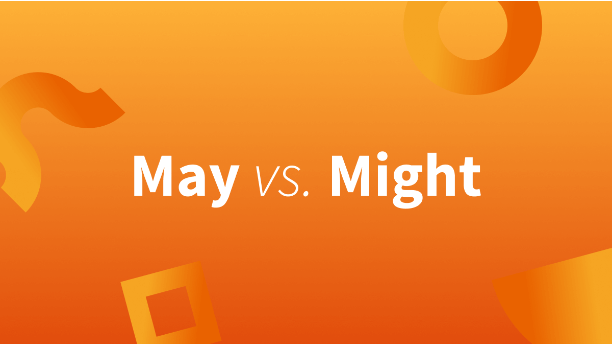May Vs Might: A Comprehensive Guide to Proper Usage
Contents

Do you ever find yourself confused about when to use "may" and when to use "might" in English? The distinction between these two words can be quite subtle, leading to uncertainty even for native speakers.
Imagine this scenario: You're planning a trip with your friend, and you want to express uncertainty about the weather. Would you say, "It may rain tomorrow" or "It might rain tomorrow"? This example demonstrates how choosing between "may" and "might" can impact the meaning of a sentence. It's crucial to know when to use each word correctly to convey your intended message accurately.
In this comprehensive guide on the proper usage of "may" vs "might", we will explore the nuances of these two modal verbs in depth. We will cover their meanings, provide examples of correct usage, delve into pronunciation differences, and equip you with the knowledge needed to confidently use these words in everyday conversations.
By the end of this guide, you'll have a solid understanding of when to use "may" and when to use "might". So let's dive in!

Understanding May Vs Might
Understanding the proper usage of modal verbs is essential for effective communication in English. Two commonly used modal verbs that often cause confusion are "may" and "might". While these words may seem similar, they have distinct meanings and uses. In this section, we will explore the key differences between "may" and "might" in terms of meaning, usage, examples, and pronunciation.
1) Meaning:
Both "may" and "might" express possibility, but with different degrees of certainty.
"May" is used when there is a higher likelihood or probability.
On the other hand, "might" suggests a lower possibility or a hypothetical situation.
2) Pronunciation:
Correct pronunciation is crucial for effective communication. Here are some guidelines for pronouncing "may" and "might":
May: Pronounced as /meɪ/
Might: Pronounced as /maɪt/
Now that you have a better understanding of the differences between these two modal verbs in terms of meaning and pronunciation, you can confidently use them in your conversations and writing. Remember to pay attention to the level of certainty when choosing between "may" and "might".
For a quick explainer check out this video on the differences between, meaning, and pronunciation of "may" and "might" from Clapingo:
How to Use May and Might?
Let's explore how to use may and might in different contexts.
1) Using "may" to express present or future possibility or permission:
Present Possibility: Use "may" when there is a chance that something will happen in the present. For example, "She may come late." This indicates that there is a possibility of her arriving late.
Future Possibility: Employ "may" to indicate a possibility that something will happen in the future. For instance, "They may go on vacation." This suggests that there is a chance they will go on vacation at some point.
Permission: "May" can also be used to seek permission. For example, "May I borrow your pen?" This politely asks for consent to borrow someone's pen.
Requests: Similar to seeking permission, you can use "may" for requests. For instance, "May I have some water?" This asks politely for water.
Here are some examples of using "may" in different contexts:
- You may find it helpful to practice speaking English every day.
- May I have your attention, please?
- She may join us for dinner if she finishes work early.
- May I use your restroom?
2) Using "might" to express past, present, or future possibility, uncertainty, or hypothetical situations:
Past Possibility/Uncertainty: Use "might have" when expressing uncertainty about something that could have happened in the past. For example, "She might have forgotten her keys." This suggests there is uncertainty about whether she forgot her keys or not.
Present Uncertainty/Hypothetical Situations: Employ "might" when expressing uncertainty or hypothetical situations in the present. For instance, "It might snow tomorrow." This indicates that there is a possibility of snow, but it is uncertain.
Polite Suggestions: "Might" can be used to make polite suggestions. For example, "You might want to consider studying more." This suggests a polite recommendation without being too direct.
Here are some examples of using "might" in different contexts:
- He might have left the office early today.
- We might go to the beach if the weather is good.
- You might want to bring an umbrella just in case.
It's worth noting that "might" is slightly more formal than "may" and often used in written English or formal situations.
When choosing between "may" and "might," it is essential to consider the context and purpose of your communication. Understanding the nuances will help you convey your message accurately and effectively.
Remember, practice makes perfect! Keep exploring may vs might usage, meaning, examples, and pronunciation to enhance your language skills with Clapingo blogs and courses. You can also test your understanding by taking some tests from the list of may and might exercises available on Agenda Web.
Common Mistakes and How to Avoid Them
Mistakes in using "may" and "might" are quite common, as the two words are often confused. Let's address some of the most common usage scenarios and explore how to avoid these mistakes.
1. Difference between present possibility and future possibility:
One mistake people make is not understanding the distinction between "may" and "might" when expressing present or future possibilities. Use "may" when there is a higher degree of certainty, and "might" when there is a lower degree of certainty.
Incorrect: I might go to the party tonight.
Corrected: I may go to the party tonight.
In this example, using "may" instead of "might" conveys a higher level of certainty about going to the party.
2. Distinguishing past possibility from uncertainty:
Another common mistake is using "may" or "might" incorrectly when talking about past possibilities. Use "might have" for past possibilities that didn't happen, and use "may have" for past possibilities that actually occurred.
Incorrect: She may have missed her flight yesterday.
Corrected: She might have missed her flight yesterday.
In this case, using "might have" instead of "may have" indicates an unrealised past possibility.
3. Using "might” instead of “may” in polite requests or suggestions:
Sometimes, people mistakenly use “might” when making polite requests or suggestions, but it should be “may” in such cases.
Incorrect: Might I borrow your pen?
Corrected: May I borrow your pen?
Using “may” here sounds more polite and appropriate in a formal setting.
By being aware of these distinctions, you can avoid common mistakes in may vs might usage. Remember, practice makes perfect, so keep practising with examples to strengthen your understanding of the correct usage.
Tips and Tricks to Remember the Usage of May and Might
To help you differentiate between "may" and "might", here are some easy-to-remember mnemonic devices and tricks. These will not only assist you in understanding the meaning but also reinforce their proper usage with creative examples.
1. Mnemonic Devices:
a) "May is for possibilities, while might is for hypotheticals." This simple phrase can help you remember that may is used when there is a chance or probability of something happening, whereas might is used to express a more uncertain or hypothetical situation.
b) "May for permission, might for past tense." This association helps you remember that may is commonly used to ask for permission in the present or future, while might is often used to convey past possibility or uncertainty.
2. Creative Examples:
a) May:
- I may go for a walk this evening if the weather improves. (possibility)
- May I borrow your pen? (permission)
b) Might:
- She might have missed her flight because of the traffic. (uncertainty in the past)
- He asked if he might use my phone to make an urgent call. (polite request)
By using these mnemonics and examples, you can develop a better understanding of when to use may and might. Remembering these associations will enable you to choose the correct word in various situations.
May Vs Might in Indian Languages
In India, different languages have their unique ways of expressing the concepts of "may" and "might". Let's explore how these two words are used in popular Indian languages such as Hindi, Bengali, Malayalam, Tamil, and more.
Here is a table listing translations and corresponding usage scenarios:
Language | Translation of "May" | Translation of "Might" | Usage Scenarios |
Hindi | सकता है (sakta hai) | हो सकता है (ho sakta hai) | 1. May I come in? - क्या मैं अंदर आ सकता हूँ? 2. He may be late - वह देर से आ सकता है |
Bengali | হতে পারে (hote pare) | হতে পারে (hote pare) | 1. You may go now - এখনো তুমি যাওয়া যাবে 2. She might join us later - সেই পরে স্থানান্তরিত হতে পারে |
Malayalam | സാധ്യമാണ് (saadhyamaanu) | മുക്കിൽ പോകേണ്ടതെന്ന് (mukkil pokenātathenna) | 1. He may come with us - അവൻ ഞങ്ങൾക്കും സമ്മിശ്രം വരും 2. She might not understand - അവൾ അറിയുന്നില്ലെങ്കോ |
Please note that these translations may vary depending on the dialect or region within each language.
By understanding the usage of "may" and "might" in Indian languages, you can enhance your communication skills and express possibilities more effectively.
Final Thoughts
As we wrap up this comprehensive guide on the proper usage of "may" and "might," let's quickly recap the main points we discussed.
Mastering the correct usage of "may" and "might" is essential for effective communication in English. These two modal verbs hold different levels of possibility or probability, which can greatly impact the meaning of your sentences. By using them accurately, you can convey your intentions clearly and avoid any confusion.
To truly internalise the correct usage of "may" and "might," it's crucial to practice using them in various contexts. Incorporate these modal verbs into your everyday conversations, presentations, and writing exercises. By doing so, you will gradually gain confidence in their application and improve your overall spoken English skills.
As an Indian learner looking to enhance your English speaking skills, Clapingo is a reliable platform that can assist you on this journey. With its tailor-made courses and experienced tutors, Clapingo offers a supportive environment for mastering not only may vs might usage but also various other aspects of English language learning.
FAQs
1. What is an example of "may" and "might"?
May and might are both modal verbs used to express possibility or permission, but there is a slight difference in their usage.
For example:
You may win the lottery if you buy a ticket.
She might come to the party if she finishes her work on time.
2. Is "might" more formal than "may"?
Yes, "might" is generally considered more formal than "may". While "may" is commonly used in everyday conversation, "might" is often found in formal writing or more polite requests.
For example:
May I have a glass of water? (casual)
Might I have a moment of your time? (formal)
3. Is it "may" or "might" for kids?
When teaching children the distinction between "may" and "might", it's best to start with simpler examples using "may". As they become more familiar with the concept of possibility, you can introduce the use of "might".
For example:
May I have a cookie? (starting point)
You might want to bring an umbrella in case it rains. (gradual progression)
4. Is "may" a synonym of "might"?
Although both words express similar meanings, they are not synonyms. While both indicate possibility, "may" suggests a higher likelihood than "might".
For example:
She may be late for the meeting. (higher likelihood)
He might join us for dinner later. (lower likelihood)
Comments
Your comment has been submitted